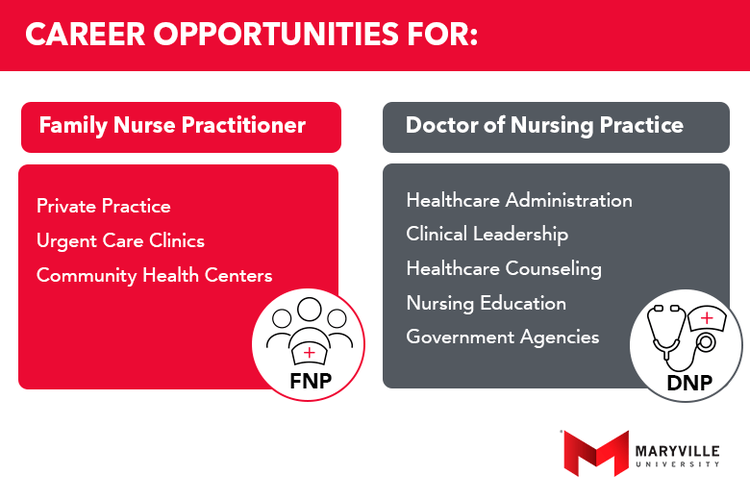Family Nurse Practitioner (FNP) vs. Doctor of Nursing Practice (DNP): Understanding the Differences

If you’re considering a career in nursing, many specialties and degree options are available, and it can take time to determine which path is right for you.
This article explores the differences between two popular nursing degrees: family nurse practitioner (FNP) and doctor of nursing practice (DNP). While both degrees allow you to work as a nurse practitioner, a DNP requires additional education and training.
Deciding which degree to study starts with establishing your career goals and interests.
If you want to focus on providing primary care services to patients, an FNP may be the better choice for you. However, if you are interested in leadership roles, research, or teaching, a DNP may be a better fit.
What are the differences between FNPs and DNPs?
Both FNP and DNP degrees offer exciting and rewarding career paths in nursing.
While the roles associated with both share some similarities, such as the opportunity to work as nurse practitioners, there are significant differences in the education requirements, scopes of practice, and earning potential.
Education
The first major difference between an FNP and a DNP is the level of education required.
To become a nurse practitioner, one must obtain a graduate-level nursing education, typically a Master of Science in Nursing (MSN) degree. However, within MSN programs, individuals can choose between a generic MSN, which provides a broad foundation in advanced nursing practice, or a Family Nurse Practitioner (FNP)-focused MSN, which offers specialized training in primary care for individuals across the lifespan, emphasizing preventive care and health promotion. This typically takes two to three years to complete and requires a Bachelor of Science in Nursing (BSN) as a prerequisite.
Furthermore, individuals who have completed a generic MSN program can pursue additional post-graduate certification in specialized areas such as acute care, pediatric care, psychiatric-mental health, or gerontology. These certifications provide advanced knowledge and skills in specific patient populations or practice settings, allowing nurse practitioners to further specialize and meet the diverse healthcare needs of their communities.
The next level, a DNP is one of two terminal, doctorate-level credentials that represent the highest echelon of nursing education. To become a DNP, you must complete a doctoral program that can take an additional three to six years to finish. While some DNP programs accept students with BSNs, most require an MSN as a prerequisite. BSN to DNP typically takes longer than a MSN to DNP, as with the latter, students already have more graduate-level coursework and NP experience.
While a DNP is a doctoral degree, it does not entitle the holder to use the title "doctor" in a clinical setting. However, they can use the title in academic or research settings. An MSN-prepared FNP cannot be called "doctor" unless they hold a doctoral degree in another field.
Another complexity is that a DNP is a terminal nursing degree. But since DNPs may still practice, they are still able to specialize. It's possible to earn a DNP with an FNP specialization, meaning FNP isn't exclusively master's-level but may also be doctoral. Maryville's MSN and DNP programs, for example, both offer multiple specialization opportunities.
Scope of practice
Another significant difference between an FNP and a DNP is their scope of practice. FNPs tend to focus directly on practice, whereas DNPs may hold additional roles and responsibilities beyond patient-focused nursing practice.
As an FNP, you will provide primary care services to patients of all ages, including diagnosing and treating illnesses, prescribing medications, and ordering diagnostic tests. You will work under the supervision of a physician and collaborate with other healthcare professionals to provide comprehensive care to your patients.
A DNP has a broader scope of practice. In addition to providing primary care services, a DNP can work in leadership positions, conduct research, and teach at the university level. DNPs are trained to evaluate and improve healthcare systems and policies, making them valuable assets in healthcare organizations.
Salary and job outlook
When it comes to salary and job outlook, both FNPs and DNPs career paths offer exciting prospects for aspiring nurse practitioners.
A growing need for accessible healthcare services, physician shortages, and the increasing autonomy of NPs contribute to the growing demand for NPs.1
The average salary for an FNP is $124,030 as of February 26, 2024.2
The average salary for a DNP is $133,600.3
When asked, DNP holders report that they sought the degree because of their interest in research and teaching more than the difference in salary or role responsibilities.
Salaries can differ significantly based on the following:
- Your level of education
- Any certifications you've earned
- Extra skills you bring to the table
- How long you've been working
- What clinical setting you work in
- Where you live
For example, according to the Bureau of Labor and Statistics, the median salary for NPs in California is the highest at $158,130 and the median salary for NPs in Tennessee is the lowest at $99,330.4
The job outlook for nurse practitioners at any level is also excellent, with a projected growth rate between 38% and 45% across different sources.1,5
By understanding these differences, you can make an informed decision about which degree is right for you.
Visit our family nurse practitioner page to learn more.